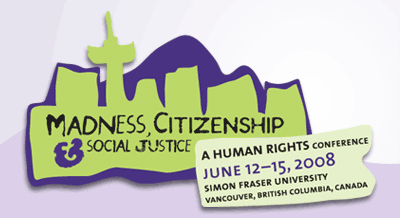About the Conference
The subject matter of this public conference could not be more timely or vital. The past two decades have witnessed an intensification of controversy and debate regarding the citizenship and human rights of psychiatrized peoples. Various jurisdictions have enacted restrictive mental health legislation liberalizing commitment procedures and sanctioning mandatory community treatment; somatic forms of intervention have regained ascendancy in mental health settings; biological psychiatry, with its commitment to traditional medical model theories and practices, has become the governing perspective in many academic and institutional contexts; and policies of fiscal restraint, deinstitutionalization and privatization have eroded services and precipitated the dumping of countless former psychiatric inmates into urban “landscapes of despair.” Conversely, over recent years these conservatizing trends have met with a critical groundswell of rights activism and anti-psychiatry resistance. Psychiatric users and survivors have become increasingly visible and proactive on various political fronts, organizing and aligning themselves with community groups, legal advocates and other constituencies in their collective struggles for adequate medical care, housing, education, employment, and legal and civil protections.
By recruiting participants from these various constituencies, this conference will provide a sharp counterpoint to the prototypical meetings of clinical, professional and academic associations concerned with issues related to ‘mental illness’ and psychiatry. This event will be unique in offering a venue for the advancement of multi-vocal, progressive and counter-hegemonic perspectives on these critical topics and issues. The intention is to establish a context of mutual knowledge-sharing and empowerment, and to develop longer-term strategies that will permit activists, survivors, scholars and other participants to interact, share experiences, develop connections and engage in problem-solving praxis. Reflecting program initiatives currently being advanced by the Simon Fraser University Institute for the Humanities and the Department of Humanities, questions of citizenship, civil liberties and human rights will be paramount. Individually and collectively, the contributors to this conference will all, in various ways, be involved in theorizing, research and activism that are subversive of oppressive power relations, and that promote the autonomy, dignity, empowerment and health of disenfranchised people within the ‘mental health’ sphere, and more generally.
The conference will adopt a multimedia format. We will launch the four-day event on Thursday June 12th with a public keynote session that addresses overriding issues related to citizenship and social justice for psychiatrized people. On the final evening (Saturday June 14th), a public screening and retrospective of the landmark documentary Titicut Follies will occur on the 40th anniversary of its release (and banning by the Commonwealth of Massachusetts), with its world-renowned director Frederick Wiseman in attendance. The main panel program will consist of concurrent sessions running in serial slots though the mornings and afternoons of Friday June 13th and Saturday June 14th. Further, we hope to curate an exhibition of psychiatric survivor; to provide computer exhibits of websites operated by the Psychiatric Survivors Archives of Toronto (PSAT) and the History of Madness in Canada / Histoire de la folie au Canada website collective; and to convene other cultural events relevant to the conference themes (announcements forthcoming).













